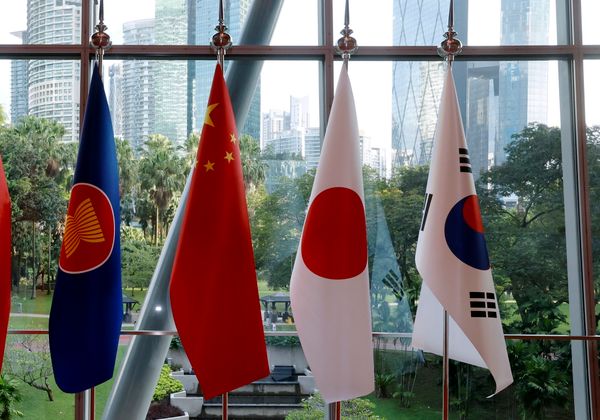By Danial Dzulkifly
KUALA LUMPUR, April 9 — The Asean Plus Three economies have successfully lifted billions out of poverty within a generation, a remarkable achievement now under threat as trade wars intensify, says prominent economist and former central banker Tan Sri Andrew Sheng.
Despite Asean’s loose economic and regulatory framework, Sheng said the bloc and its trade partners, China, Japan and South Korea, have always operated by consensus.
“In one generation, we moved from colonialism to independent countries that can think for themselves, who have begun to work with each other, despite many saying we can’t, because we’re not like Europe.
“But we don’t want to be like Europe. We are Asean, a family. And while families may quarrel, we move through consensus,” he said during a fireside chat panel session at the Asean Investment Conference 2025 held at the Kuala Lumpur Convention Centre here today.
Sheng said the potential fallout from the 25 to 40 per cent tariffs announced by United States President Donald Trump on April 2 is part of a broader policy shift away from multilateral trade towards protectionism.
“The impact will be severe, especially for SMEs (small and medium enterprises) that have already forward-sold their exports or imports. If you’re suddenly required to pay up to 40 per cent in cash upfront just to get your goods into the US, and your profit margins are only 10 or 15 per cent, you’d likely go bankrupt,” said Sheng.
[caption id="attachment_274561" align="aligncenter" width="1200"] A trailer seen near containers at a Westports facility in Pulau Indah, Klang, on October 17, 2013. — Picture by REUTERS[/caption]
A trailer seen near containers at a Westports facility in Pulau Indah, Klang, on October 17, 2013. — Picture by REUTERS[/caption]
He also described the current situation as a case of “announcement shock”, warning that the real consequences, including project slowdowns, cash flow issues and delayed investments, would unfold gradually.
“Psychologically, we must be prepared for the worst. We cannot afford to wait for external help anymore,” he said.
Likening Asean to a mousedeer caught between warring giants, Sheng said the region must remain nimble, fast and flexible to avoid being crushed by great power rivalries, including those between the US, the European Union and China.
“Remember, when elephants fight, the grass gets trampled, but the grass outlives the elephants. Resilience is key. Doing nothing is no longer an option,” he said.
Asean, Sheng argued, cannot depend on traditional negotiation frameworks in the face of such unilateral action.
He said the only way forward is to double down on regional trade cooperation, digital innovation and inclusive economic models that empower SMEs, particularly through local-to-local currency trade settlements and the swift adoption of artificial intelligence (AI) and digital infrastructure.
“The faster we use AI to boost productivity, the more competitive we become,” he said, pointing to new tools like Asean’s cross-border QR code system, which enables easier SME trade within the region.
He also called for a rethink of traditional financial structures, saying Asean must shift away from debt-heavy models towards equity-based financing, citing Islamic finance principles such as risk-sharing as a more resilient approach.
“We learnt from the Asian Financial Crisis and became conservative, but we never really moved from debt to equity. Equity means fairness,” he said.
[caption id="attachment_374174" align="aligncenter" width="1200"] Figurines with computers and smartphones seen in front of the words ‘Artificial Intelligence AI’ in this illustration taken on February 19, 2024. — Picture by REUTERS[/caption]
Figurines with computers and smartphones seen in front of the words ‘Artificial Intelligence AI’ in this illustration taken on February 19, 2024. — Picture by REUTERS[/caption]
Citing regional tech success stories such as Grab and Gojek, Sheng said Asean has the talent and potential to lead in digital innovation but is often held back by a risk-averse mindset.
“We’ve been taught to avoid failure, to be polite, but failure is essential for success,” he said.
Sheng also addressed rising nationalism within Asean and Malaysia, including calls for greater autonomy in Sabah and Sarawak, warning that internal disunity would leave the region vulnerable to external pressures.
“History teaches us that empires fall either from external invasion or internal corrosion. We need to close the door, have honest conversations, and stay united,” he said.
He also urged policymakers to focus on regional self-reliance and innovation rather than reactive policy shifts dictated by global superpower politics.
The Asean Plus Three grouping was originally formed in response to the 1997 Asian Financial Crisis and has since become a key platform for regional dialogue and cooperation.
Collectively, the 13 economies represent more than 30 per cent of global GDP and over half the world’s foreign exchange reserves.
On April 2, the US administration announced sweeping tariffs affecting nearly all trading partners, including Malaysia. As of April 5, all Malaysian exports to the US are subject to a minimum duty of 10 per cent, which will rise to 24 per cent for most products by April 9.
Malaysia’s semiconductor exports received partial exemptions, while the rubber, plastics, textiles and furniture sectors are expected to be hit hardest.
According to a tariff annexe released by the White House, Malaysia and Brunei face a 24 per cent tariff, while Cambodia (49 per cent), Laos (48 per cent), Vietnam (46 per cent), Myanmar (45 per cent), Thailand (37 per cent) and Indonesia (32 per cent) face even steeper rates.
The White House posted a separate statement on the social media platform X stating that tariffs for the Philippines is set at 18 per cent, while Singapore 's is at 10 per cent.
[caption id="attachment_395901" align="aligncenter" width="1200"] United States President Donald Trump holds up a list of tariffs on other countries at the White House in Washington DC, the United States, on April 2, 2025. —Picture by REUTERS[/caption]
United States President Donald Trump holds up a list of tariffs on other countries at the White House in Washington DC, the United States, on April 2, 2025. —Picture by REUTERS[/caption]


